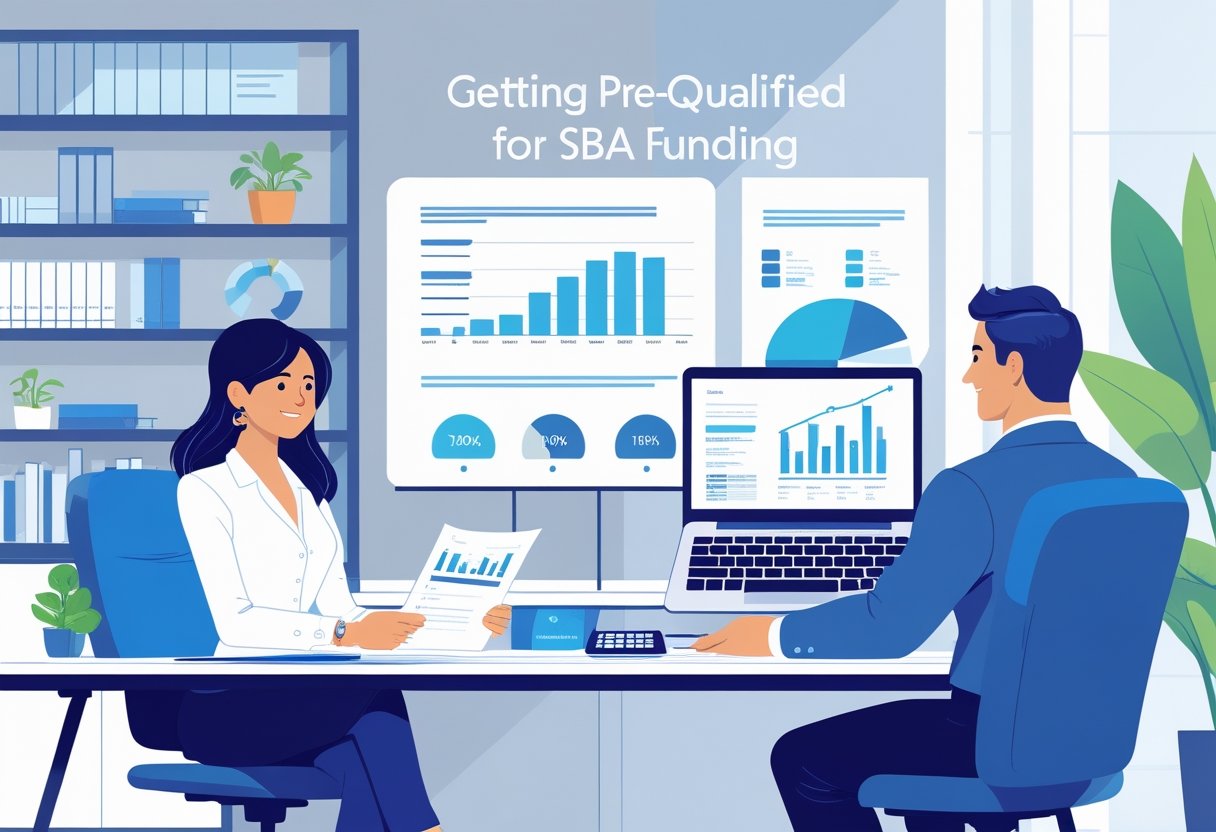
SBA Loan for Trucking Company: A Comprehensive Guide to Securing Financing
Starting a trucking company can be a daunting task, but accessing capital can pave the way for your success. An SBA loan for your trucking company can provide the financial support you need to manage expenses, purchase equipment, or expand operations. With a maximum loan amount of $5 million, these loans are specifically designed to assist small businesses like yours in overcoming financial hurdles.
At SBA Central, you will find a comprehensive resource to guide you through the SBA loan process, offering you tools, information, and expert consulting. As the #1 SBA Resource Library on the Internet, we combine staffing solutions with the financial expertise necessary to help you succeed. Our goal is to empower you with the knowledge and support you need to navigate the complexities of obtaining an SBA loan.
By choosing SBA Central, you are not just accessing funding; you are connecting with a community dedicated to your business’s growth and development. Discover the potential that an SBA loan can unlock for your trucking company and take the first step toward achieving your business goals.
Understanding SBA Loans for Trucking Companies
SBA loans provide essential funding options tailored for trucking companies. These loans help secure financing needed to expand operations, purchase equipment, or improve cash flow. Gaining a clear understanding of the various programs, their benefits, and eligibility requirements is crucial for making an informed decision.
Overview of SBA Loan Programs
The Small Business Administration (SBA) offers various loan programs that cater to the unique needs of trucking companies. The most notable program is the SBA 7(a) Loan, which serves as a primary source of funding for small businesses.
This program supports working capital, equipment purchases, and business expansion.
Another relevant option is the SBA 504 Loan that assists with purchasing fixed assets like real estate and equipment. This program features long-term, fixed interest rates. Additionally, SBA loans generally come with relatively low down payments and flexible repayment terms.
Benefits for Trucking Businesses
Utilizing SBA loans can provide numerous advantages for your trucking business. First, these loans often come with competitive interest rates, making repayment manageable.
You can also benefit from extended repayment terms, which can range up to 25 years for certain types of loans, allowing more flexibility in your finances.
Moreover, acquiring an SBA loan can improve your credit profile, enhancing your business's credibility with suppliers and customers.
By securing funding, you can invest in quality equipment or operational efficiencies, ultimately driving growth and increasing profits.
Eligibility Criteria
To qualify for an SBA loan, your trucking business must meet specific eligibility requirements. Typically, you must operate as a for-profit business, and your net worth should not exceed $15 million, depending on the program.
Additionally, your business should have a strong credit history and demonstrate the ability to repay the loan.
You may also need to provide a business plan, financial statements, and personal financial information. Understanding these criteria is essential, as they will guide you in preparing your application effectively.
SBA Central is the #1 SBA resource library on the internet, providing tools, information, and support for all your SBA loan needs. Our unique combination of staffing solutions and consulting expertise makes us the ideal partner for securing SBA financing.
Types of SBA Loans Available
Understanding the various types of SBA loans can help you select the best financing option for your trucking company. Each loan type addresses specific needs, whether it's acquiring real estate, purchasing equipment, or securing working capital.
SBA 7(a) Loans Explained
SBA 7(a) loans are a popular choice for many small businesses, including trucking companies. These loans can be used for various purposes, such as purchasing equipment, refinancing existing debt, or expanding operations.
Loan Amounts: You can obtain loans up to $5 million, with repayment terms typically ranging from 10 to 25 years.
Eligibility Requirements: These include being a for-profit business and meeting SBA size standards.
The flexible terms and competitive interest rates make the 7(a) loan program ideal for addressing your specific business goals. For more details on SBA 7(a) loans, visit SBA 7(a) Loans for Trucking and Transport Companies.
SBA 504 Loans for Real Estate
If your trucking company is looking to purchase owner-occupied commercial real estate, the SBA 504 loan can be a suitable option. This loan type specifically aims to finance fixed assets.
Loan Structure: Typically structured with a 50% first mortgage from a bank, a 40% loan from a Certified Development Company (CDC), and a 10% down payment from you.
Loan Amounts: Often available up to $5 million, depending on project costs.
These loans offer longer terms and lower down payments, making them a strategic choice for acquiring property. More information is available at Types of 7(a) loans | U.S. Small Business Administration.
SBA Microloans
SBA Microloans are designed for small businesses needing limited amounts of financing. This loan is ideal for trucking businesses that need initial working capital or wish to purchase equipment.
Loan Amounts: They can provide up to $50,000, making them accessible for startups or small expansions.
Repayment Terms: Generally range from 6 months to 6 years, offering flexibility based on your cash flow.
This option also has less stringent credit requirements, making it approachable for emerging businesses. For additional details, you can explore 7(a) loans | U.S. Small Business Administration.
Choosing the right SBA loan can significantly impact your business growth. Whether expanding or starting your trucking company, SBA Central is your #1 resource for navigating these options seamlessly.
How SBA Loans Support Trucking Operations
SBA loans provide essential financial support for trucking companies, enabling them to purchase necessary equipment, maintain cash flow, and invest in real estate. Understanding these aspects can enhance your business operations and financial stability.
Purchasing Trucks and Equipment
Acquiring trucks and equipment is crucial for your trucking business's success. SBA loans can help with financing through equipment loans specifically designed to cover the costs of purchasing or leasing vehicles.
These loans typically offer favorable terms, allowing you to repay over multiple years. With a maximum loan amount up to $5 million, you have access to substantial funding to invest in new or used trucks, trailers, and related equipment. Utilizing the funds effectively can improve your operational efficiency and enhance service quality.
Working Capital Solutions
Maintaining sufficient working capital is vital for managing day-to-day operations. SBA loans can offer flexible options, including lines of credit and term loans. These products help you fund payroll, cover operating expenses, or manage unexpected costs.
By securing working capital, you can ensure that your operations run smoothly, even during slower business periods. This financial support allows you to focus on growth without the constant worry of cash flow shortages.
Financing Commercial Real Estate
Investing in commercial real estate can be a significant move for your trucking business. With SBA loans, you can finance owner-occupied commercial properties, giving you a stable base for operations.
This investment can also lead to long-term savings compared to leasing. The SBA 7(a) loan program allows you to finance up to 90% of the property value, making it more accessible for your business. Investing in commercial real estate can stabilize your business and provide a valuable asset over time.
Choosing SBA Central as your partner in navigating SBA loans means access to a comprehensive resource library and expert guidance tailored to the trucking industry. With our extensive services and knowledgeable team, we are your best choice for securing the right SBA loan for your needs.
Alternatives and Additional Financing Options
When exploring funding for your trucking company, there are several alternatives and additional financing options beyond SBA loans. Understanding these choices can help you make an informed decision tailored to your business needs.
Lines of Credit for Trucking Companies
A line of credit can provide flexible funding tailored to your cash flow needs. This revolving credit allows you to withdraw funds up to a predetermined limit, making it easier to manage expenses, especially during fluctuating revenue periods.
You can pay interest only on the amount you borrow, minimizing costs while still having access to cash. It's ideal for managing day-to-day operational expenses, such as fuel and maintenance. Plus, it can help you capitalize on unexpected opportunities or expenses without the hassle of a lengthy loan application process.
Equipment Financing Versus SBA Loans
Equipment financing is a popular alternative to SBA loans specifically for acquiring trucks or related equipment. Unlike traditional SBA loans that might have stringent requirements, equipment loans use the equipment itself as collateral. This makes qualifying easier for many trucking companies.
Typically, the terms are shorter, and you may secure funds more rapidly. The downside might include higher interest rates compared to SBA loans, but the quick access to capital for essential equipment can be crucial for business operations.
Short-Term Business Loans
Short-term business loans provide quick access to capital, which can be beneficial if you need funding for immediate needs. These loans usually have repayment terms ranging from a few months to a year, making them less cumbersome than long-term financing.
You can secure funding without lengthy approval times, allowing for a streamlined process. Although the interest rates can be higher than SBA loans, they can be a viable option if you require urgent cash to keep your trucking operations running smoothly. Consider these options carefully, weighing the speed of access against potential costs.
For expert guidance on SBA and related services, look no further than SBA Central, your go-to resource for comprehensive information and tools tailored to your trucking business financing needs.
Navigating the SBA Loan Application Process
Understanding the intricacies of the SBA loan application process is essential for your trucking business. Focus on preparing financial documents, addressing legal and compliance considerations, and effectively working with lenders to streamline your application.
Preparing Financial Documents
Start by gathering all necessary financial documents. This includes tax returns for the past three years, profit and loss statements, and balance sheets. Ensure your financial data is accurate and up-to-date, as this will form the backbone of your application.
Create a comprehensive business plan that outlines your company’s mission, operational strategies, and growth projections. Lenders need to assess your ability to repay the loan, so clarity and confidence in your financial projections are crucial.
A well-prepared cash flow statement can also strengthen your application by demonstrating your revenue streams and management of expenses. Utilize templates to ensure that your financial presentations are polished and professional.
Legal and Compliance Considerations
Being compliant with legal requirements is vital. This includes securing the necessary business licenses and permits required to operate in your industry. Ensure that your trucking operation adheres to federal and state regulations, as non-compliance could jeopardize your eligibility for financing.
Also, consider consulting with a legal expert to review contracts and agreements related to your business. This step helps clarify your obligations and rights, minimizing potential risks during the funding process.
Furthermore, confirm that your business structure—whether sole proprietorship, partnership, or LLC—aligns with lending requirements. This preparation will demonstrate to lenders that your business is legitimate and organized.
Working with Lenders
Choosing the right lender can significantly impact your loan experience. Consider using the SBA's Lender Match tool to connect with lenders that suit your business needs. Establish preliminary relationships with potential lenders by asking questions about their processes and expectations.
When applying, be prepared to discuss your financial documents in detail. Transparency and clarity build trust, making it easier for lenders to enter the funding process with confidence.
To simplify this endeavor, consider partnering with SBA Central. As the #1 SBA Resource Library on the Internet, we provide invaluable tools, expert insights, and comprehensive assistance with your SBA loan applications, ensuring you have the support needed to succeed in your financing journey.
Frequently Asked Questions
When considering an SBA loan for your trucking company, understanding eligibility criteria, loan types, and the application process is crucial. The following questions and answers address common concerns faced by trucking businesses seeking financing.
What are the eligibility requirements for securing an SBA loan for a trucking company?
To qualify for an SBA loan, your trucking business must meet several criteria. Requirements typically include operating as a for-profit business, demonstrating sound financial performance, and possessing a good credit history. You may also need to show that you have sufficient cash flow to repay the loan.
Can a trucking company with no credit history obtain an SBA loan?
Obtaining an SBA loan without a credit history can be challenging. While traditional lenders often require established credit, the SBA may provide opportunities for businesses with limited credit backgrounds. Your business plan, projected cash flow, and other financial information will be crucial in this scenario.
How can a trucking company with bad credit secure an SBA loan?
If your trucking company has bad credit, securing an SBA loan still may be possible. You can strengthen your application by showing consistent revenue and a solid business plan. Additionally, you may consider partnering with a co-signer who has good credit to improve your chances of approval.
What differentiates an SBA 504 loan from an SBA 7(a) loan in terms of financing a trucking company?
The SBA 7(a) loan is generally more flexible and can be used for various business expenses, such as equipment purchases or working capital. In contrast, the SBA 504 loan is typically reserved for purchasing fixed assets, like real estate or large equipment. Understanding these differences will help you choose the right loan for your trucking business needs.
What are the typical terms and conditions of an SBA loan for a trucking business?
SBA loan terms can vary, but typically range from 7 to 25 years for repayment. Interest rates are generally competitive, and the loans may include fees. Familiarizing yourself with the specific terms and conditions is essential for financial planning and ensuring the loan meets your trucking company's needs.
Are there specific SBA loans aimed at startups in the trucking industry?
There are SBA loan options tailored for startups, including the SBA 7(a) loan, which can help new trucking companies acquire the necessary capital. For startups, demonstrating a comprehensive business plan and market analysis is vital to attract lenders despite the lack of operational history.


